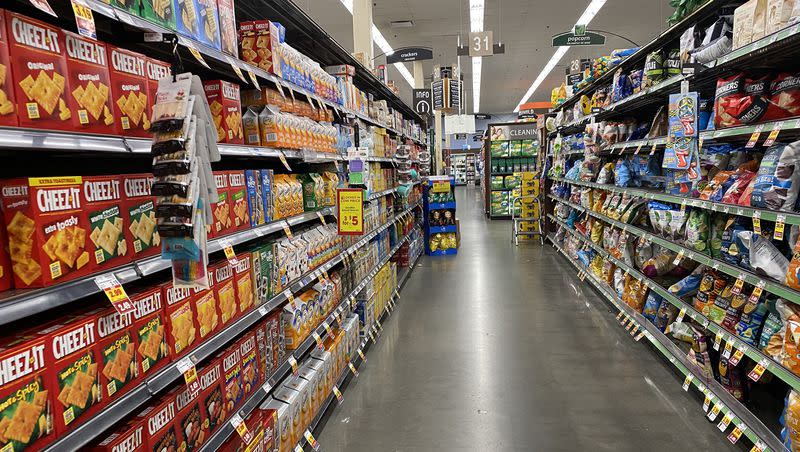Ultra-processed foods as addictive as cigarettes, study says

Ultra-processed foods with lots of refined carbohydrates and added fats — including sweets and salty snacks — may be as addictive as cigarettes.
That’s according to a new international study led by researchers from the University of Michigan, just published in the British Medical Journal’s Food for Thought special edition. The researchers, from U.S. academic institutions, Spain and Brazil, considered analysis of two research reviews that included 281 studies from 36 countries.
“There is converging and consistent support for the validity and clinical relevance of ultra-processed food addiction,” Ashley Gearhardt, professor of psychology and lead author on the study, said in a University of Michigan news release. “By acknowledging that certain types of processed foods have the properties of addictive substances, we may be able to help improve global health.”
To reach their conclusion that ultra-processed food might be addictive, researchers tested them against four scientific criteria that were used decades ago to determine that tobacco products are addictive. Things that are addictive:
Cause compulsive use.
Have mood-altering effects on the brain.
Reinforce behavior.
Trigger “intense urges and cravings.”
The university said that Gearhardt heads a food and addiction science and treatment lab that “uses a simulated fast-food restaurant to study eating behaviors.” And this is not her first work on the topic.
In an earlier release, she said, “Of note, there is no biomarker in the brain that tells us whether something is addictive or not. Identifying that tobacco products were addictive really boiled down to these four criteria, (which) have stood up to decades of scientific evaluation. Highly processed foods meet every single one of these criteria.”
Food as an addiction
Food can pose a different addiction and treatment challenge than smoking or drinking or gambling, said study co-author Alexandra DiFeliceantonio, an assistant professor at Virginia Tech. People can stop smoking or drinking or gambling. But they do still have to eat. So it’s important to figure out which foods are potentially addictive.
The study says 1 in 7 adults and 1 in 8 children appear to be addicted to ultra-processed food based on the Yale Food Addiction Scale. Those numbers are similar to addictions to alcohol and tobacco — 14% for alcohol and 18% for tobacco. The researchers said ultra-processed food addiction is associated with the biophysical changes that occur with addiction, and also with “clinically significant problems.”
As Medical News Today reported, “The Yale Food Addiction Scale assesses 11 symptomatic criteria for substance use disorder, including diminished control over intake, cravings, withdrawal, and continued use despite negative outcomes.”
“Food addiction based on the Yale scale is also associated with core mechanisms of addiction, such as reward-related neural dysfunction, impulsivity, and emotion dysregulation, as well as poorer physical and mental health and lower quality of life,” the article stated.
The researchers said that refined carbohydrates and fats create a similar dopamine effect in the brain as that seen with other addictive substances like alcohol and nicotine.
There are warning signs of addictive behaviors related to food, Tanya Freirich, who was not involved with the research but is a registered dietitian nutritionist in Charlotte, North Carolina, told Fox News. The list she gave Fox includes “thinking about food all the time or obsessively, craving foods when not hungry, craving foods as a coping mechanism, eating even after feeling full, having reduced control over intake, experiencing symptoms of withdrawal and continuing to eat certain foods despite negative consequences.”
Not all experts support the finding. Another dietitian who wasn’t part of the study, Erin Palinski-Wade of New Jersey, told Fox News she was skeptical foods can be as addictive as drugs. “Although foods rich in added sugar may stimulate the feel-good chemicals in the brain and become habit-forming, sugar itself is not addictive in the way cocaine or another drug may be,” she said.
Related
“Consuming sugar and then reducing or eliminating it from the diet will not result in withdrawal symptoms or side effects as would happen from a true addiction,” she added.
When Rachel Dixon of The Guardian put the question of food addiction to Dr. Chris van Tulleken, author of “Ultra-Processed People,” he agreed that food isn’t addictive. But he also said ultra-processed food is “not really food.”
“The purpose of food is to provide nourishment. (Ultra-processed food’s) primary purpose is profit and financial growth,” he said.
Tackling obesity, ultra-processed foods
The Centers for Disease Control and Prevention says obesity is a severe problem with grave health risks in the U.S. In 2020, the public health giant noted, 41.9% of adults were obese. Even more were overweight.
The CDC listed health conditions related to obesity, including heart disease, stroke, Type 2 diabetes and certain types of cancer. “These are among the leading causes of preventable, premature death,” the agency said.
It puts the estimated annual medical cost of obesity in the U.S. at close to $173 billion in 2019 dollars. The medical costs for adults with obesity were $1,861 higher than medical costs for people with healthy weight.
Gearhardt in the release noted that 103 countries have passed taxes on sugar-sweetened beverages and several more also tax ultra-processed foods. Studies suggest that taxes lead to a decline in sales of the item being taxed. “Furthermore these taxes have shown a reduction in body mass index among adolescent girls in countries such as Mexico,” she noted.
Putting nutrition labels on the front of targeted foods has also reduced purchases in 20 countries, per the researchers.
The researchers said they hope their findings will “stimulate research and shift attitudes.”

